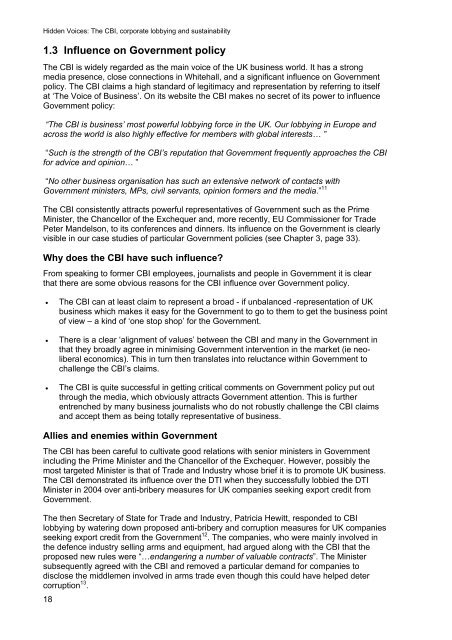hidden_voices
hidden_voices
hidden_voices
You also want an ePaper? Increase the reach of your titles
YUMPU automatically turns print PDFs into web optimized ePapers that Google loves.
Hidden Voices: The CBI, corporate lobbying and sustainability1.3 Influence on Government policyThe CBI is widely regarded as the main voice of the UK business world. It has a strongmedia presence, close connections in Whitehall, and a significant influence on Governmentpolicy. The CBI claims a high standard of legitimacy and representation by referring to itselfat ‘The Voice of Business’. On its website the CBI makes no secret of its power to influenceGovernment policy:“The CBI is business’ most powerful lobbying force in the UK. Our lobbying in Europe andacross the world is also highly effective for members with global interests… ”“Such is the strength of the CBI’s reputation that Government frequently approaches the CBIfor advice and opinion… ”“No other business organisation has such an extensive network of contacts withGovernment ministers, MPs, civil servants, opinion formers and the media.” 11The CBI consistently attracts powerful representatives of Government such as the PrimeMinister, the Chancellor of the Exchequer and, more recently, EU Commissioner for TradePeter Mandelson, to its conferences and dinners. Its influence on the Government is clearlyvisible in our case studies of particular Government policies (see Chapter 3, page 33).Why does the CBI have such influence?From speaking to former CBI employees, journalists and people in Government it is clearthat there are some obvious reasons for the CBI influence over Government policy.• The CBI can at least claim to represent a broad - if unbalanced -representation of UKbusiness which makes it easy for the Government to go to them to get the business pointof view – a kind of ‘one stop shop’ for the Government.• There is a clear ‘alignment of values’ between the CBI and many in the Government inthat they broadly agree in minimising Government intervention in the market (ie neoliberaleconomics). This in turn then translates into reluctance within Government tochallenge the CBI’s claims.• The CBI is quite successful in getting critical comments on Government policy put outthrough the media, which obviously attracts Government attention. This is furtherentrenched by many business journalists who do not robustly challenge the CBI claimsand accept them as being totally representative of business.Allies and enemies within GovernmentThe CBI has been careful to cultivate good relations with senior ministers in Governmentincluding the Prime Minister and the Chancellor of the Exchequer. However, possibly themost targeted Minister is that of Trade and Industry whose brief it is to promote UK business.The CBI demonstrated its influence over the DTI when they successfully lobbied the DTIMinister in 2004 over anti-bribery measures for UK companies seeking export credit fromGovernment.The then Secretary of State for Trade and Industry, Patricia Hewitt, responded to CBIlobbying by watering down proposed anti-bribery and corruption measures for UK companiesseeking export credit from the Government 12 . The companies, who were mainly involved inthe defence industry selling arms and equipment, had argued along with the CBI that theproposed new rules were “…endangering a number of valuable contracts”. The Ministersubsequently agreed with the CBI and removed a particular demand for companies todisclose the middlemen involved in arms trade even though this could have helped detercorruption 13 .18


